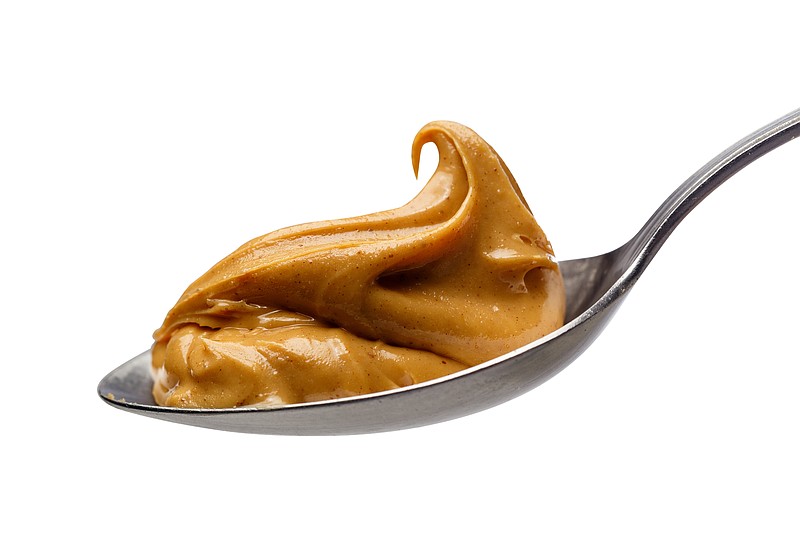Unless you are allergic to it, peanut butter, in its natural state without added sugar and oils, is one of the tastiest, healthiest, most-versatile food choices we can make.
"Peanut butter is so versatile; it can be paired with many foods - apples, carrot sticks, celery, whole-grain bread or crackers, bananas or simply on its own," says Danielle Townsend, a registered dietitian with Primary Healthcare Centers. "Peanut butter is a source of protein and healthy fats."
But like with so many of our favorite foods, consumption must be done in moderation.
"Two tablespoons is considered a serving," she says. "Peanut butter contains oil. Oil is a fat. And fats have calories."
Nevertheless, it's generally a healthy food choice, she adds.
According to the Journal of Nutrition, Health & Aging, a peer-reviewed monthly medical journal, the MIND diet, which includes peanuts along with whole grains, leafy green vegetables and berries, aids in preventing cognitive decline and can delay the progression of Parkinson's disease. Research has also shown the MIND diet may reduce the risk of developing Alzheimer's disease by as much as 53 percent.
MIND stands for the Mediterranean-DASH Intervention for Neurodegenerative Delay. DASH stands for Dietary Approaches to Stop Hypertension. Many experts regard the two diets as among the healthiest.
Peanuts are a standout because they contain high levels of niacin and are a good source of vitamin E, two nutrients that have long been known to protect against age-related cognitive decline. Plus, they're packed with protein and 19 vitamins and minerals, making them a true superfood.
"People who eat peanuts regularly have a lower risk of heart disease; and there is growing evidence that the risk of developing Alzheimer's disease is associated with risk of cardiovascular disease," says Dr. Frank Sacks, professor of cardiovascular disease prevention, department of nutrition at the Harvard T.H. Chan School of Public Health. "We surmise that peanuts could be an important component of a diet that prevents cognitive decline with aging. That is one reason why we included peanuts in the MIND study."
There are other nut butters out there - cashew, walnut, almond, sunflower seed and pumpkin seed, to name a few.
"We know that walnuts and almonds are known for their heart-healthy properties," Townsend notes. "So if you are a nut butter fan, I would think about varying your intake between several of them - just like eating the rainbow when it comes to fruits and vegetables."
The majority of Americans prefer smooth peanut butter to chunky, and there's no difference in their nutritive values. However, there's a huge difference when it comes to the brand of peanut butter you choose. Do a label check to look for additives.
"Sugar and honey can be added to nut butters, as well as different types of oils," Townsend warns. "You want to avoid nut butters with hydrogenated, palm or coconut oil. Look for simple ingredient lists."
The best peanut butters, such as Smucker's Natural, have nothing on the ingredients list except peanuts and less than 1% salt. Also avoid reduced-fat peanut butters, which tend to add more sugar to replace the flavor lost when fat is removed.
"Even organic-type nut butters may not live up to their reputation," Townsend says. "I always encourage reading the ingredients list and nutrition facts."
Townsend recently developed a handout on peanut butter with some interesting facts to give to clients.
» 540 peanuts go into making a 12-ounce jar of peanut butter.
» Arachibutyrophobia is the fear of getting peanut butter stuck to the roof of your mouth.
» Americans love peanut butter, spending almost $800 million on the creamy spread every year.
» Peanuts aren't nuts. They're actually in the legume family with lentils.
» About 1.3% of the American population is allergic to peanuts.
For many, peanut butter is the glue that holds two pieces of bread together. But it can be employed in so many dishes. For one, as a wrap with apples and raisins. The kids will love them; they're easy to pack in your child's lunchbox; and they're healthy with just 2 tablespoons of peanut butter per wrap.
Apple-Raisin Peanut Butter Wraps
4 (8-inch) whole-wheat flour tortillas
1/2 cup natural peanut butter
6 tablespoons granola cereal
1 large apple
1/2 cup raisins
Spread each tortilla within 1/2 inch of edge with 2 tablespoons peanut butter. Sprinkle 1 1/2 tablespoons granola over lower two-thirds of peanut butter. Cut apple into quarters; remove core and dice. Sprinkle apple and raisins evenly over granola.
Start rolling each tortilla, fold over both edges, and continue rolling up burrito style.
Email Anne Braly at abraly@timesfreepress.com.

